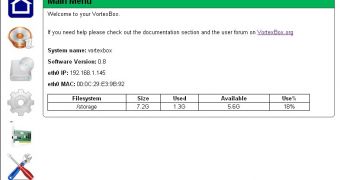Yesterday, November 22nd, Andrew Gillis proudly announced the release of VortexBox 1.6, a Fedora-based operating system that turns any computer into a music server or jukebox. The new version is based on Fedora 14 and includes bugfixes and various features.
VortexBox 1.6 is now based on the recently released Fedora 14 operating system, it brings support for 4K sector driver, 192/24 USB DACs, and USB 2. Because it's based on Fedora 14, VortexBox 1.6 also provides faster boot times, improved support for various hardware components, and faster transfers of files.
"We are pleased to announce the release of VortexBox 1.6. This release has Fedora 14, 4K sector driver support, and support for USB 2 and 192/24 USB DACs. The main goal of this release was to get VortexBox on a more current release of Fedora. This has many benefits including faster boot time, faster files transfers, and better hardware compatibility."
"The ability to support USB 2 is huge for users of high def USB DACs and USB s/pdif converters. Until now VortexBox could only support 96/24 playback. As always our goal is to create the easiest to use auto ripping CD and NAS solution. Thanks to the many VortexBox and SqueezeBox community members that helped with testing and features on this release." - said Andrew Gillis in the official release announcement. Highlights of VortexBox 1.6: · Based on Fedora 14; · Support for 4K sector driver; · USB 2 support; · Support for 192/24 USB DACs; · Faster boot times; · Faster files transfers; · Improved hardware compatibility.
About VortexBox
VortexBox is a Fedora-based Linux distribution that turns any computer into a music server or jukebox. It automatically rips Audio CDs to MP3 and FLAC files with ID3 tags and cover art, then it streams the music files to a network player such as Logitech SqueezeBox, Linn or Sonos, and even to a Windows or Macintosh system. For installation, VortexBox requires an empty hard drive. It doesn't work on a hard disk partition.
Download VortexBox 1.6 right now from Softpedia.

 14 DAY TRIAL //
14 DAY TRIAL //